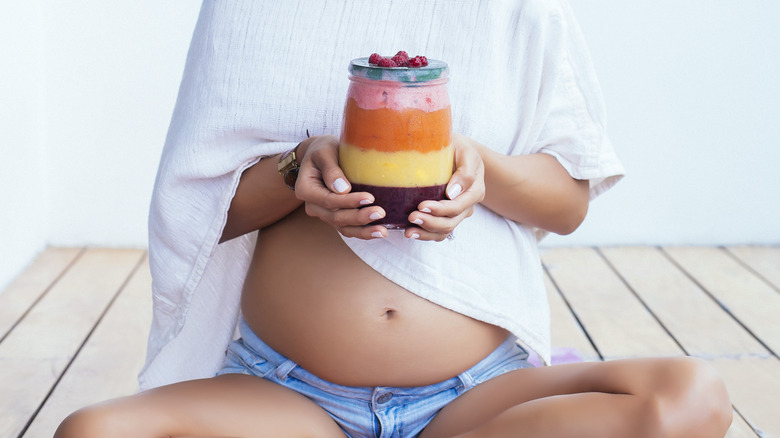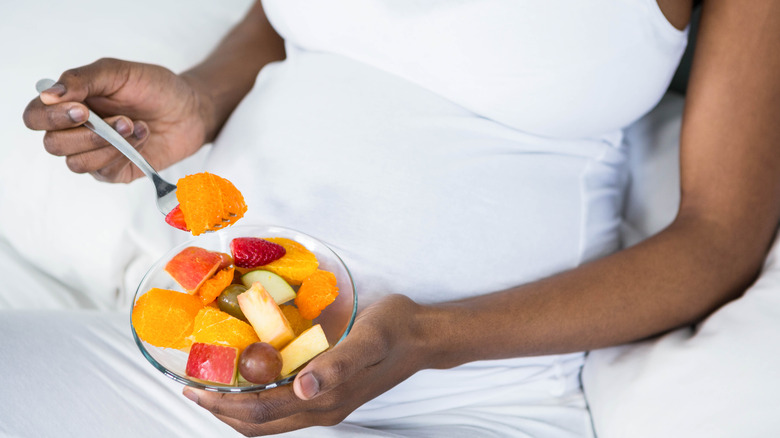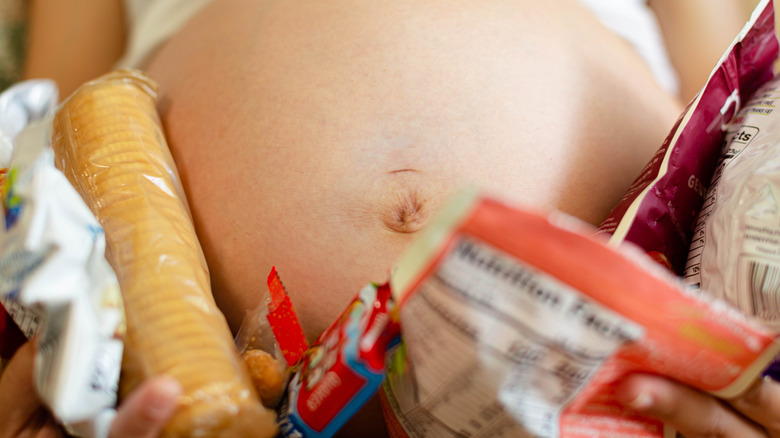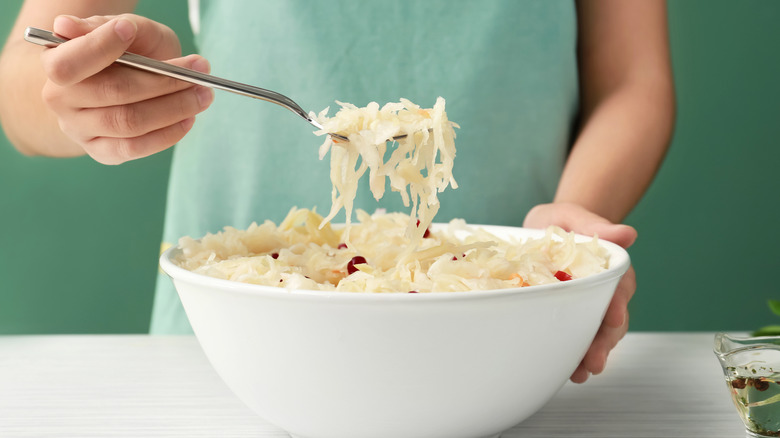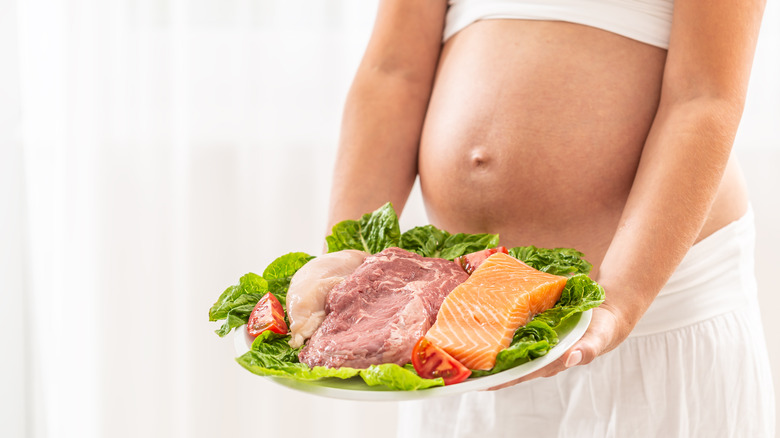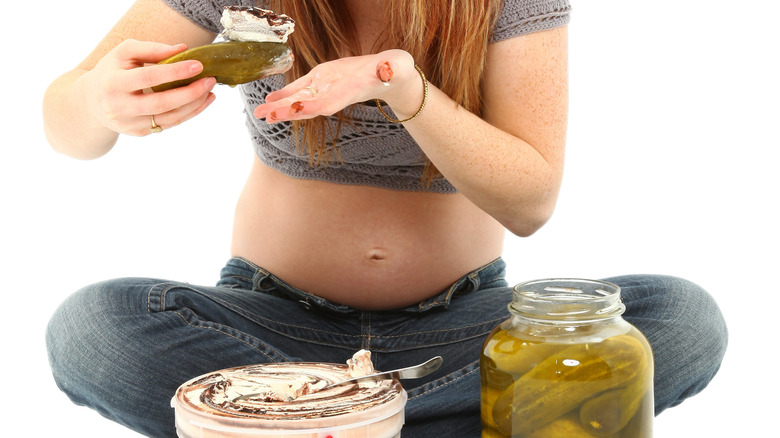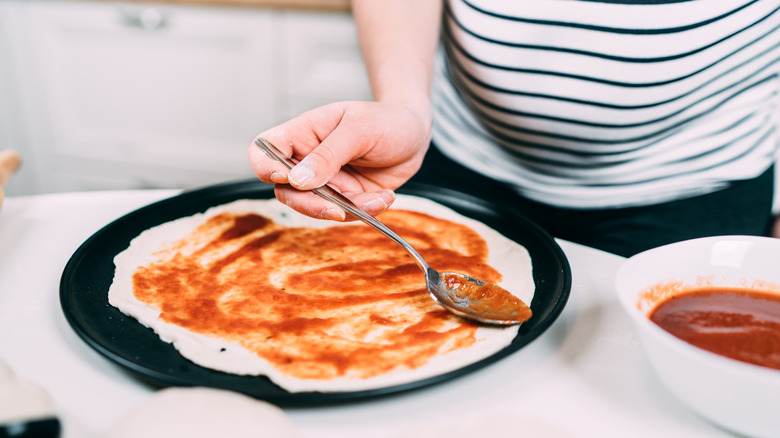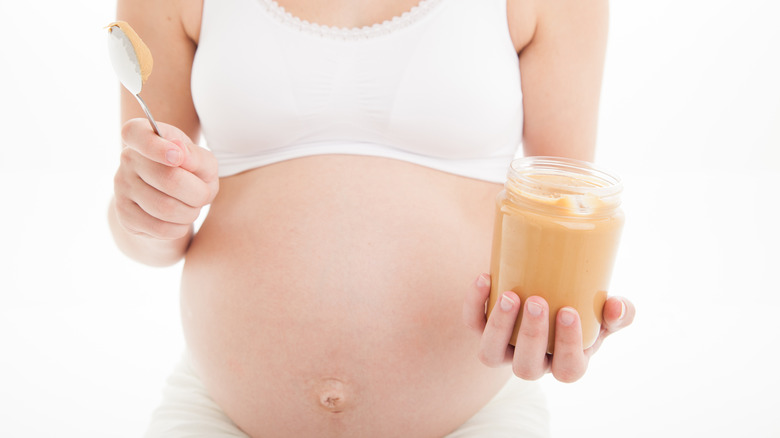Weird Pregnancy Cravings That Aren't Actually Weird At All
Pregnancy is having a palate that gives you mixed signals every few hours. One minute, you're craving a sugary glazed donut, and the next, have the urge to bite into a super salty dill pickle. What's more, you may even end up yearning for a juicy slice of steak despite being a vegan! It may be hard to keep up with your rogue taste buds, but it would give you solace to know that it's an experience pregnant women everywhere deal with. Per the BBC, expecting mothers worldwide develop an intense attraction for hard-to-resist foods from their culture. Research published in Frontiers holds that in the United States alone, 50-90% of pregnant women encounter some kind of food craving. The reasons suggested are plenty — it could be a need for comfort food or your body talking to you about its immediate needs.
An ice cream craving, for instance, could signal a nutritional deficit — would you believe it? "Ice cream is a wonderful treat, but desiring it could also indicate that your body needs something," like iodine and calcium, Dr. Aaron Gelfand notes (via Very Well). At times, your cravings may end up in bizarro territory. Cupcake with hot sauce, anyone? But unusual pregnancy cravings are far more common than you'd think. So if you find yourself pregnant and hankering for something random like ketchup only to dismiss it as strange, stop and scroll through all the weird and wonderful foods that make women's mouths water when they're expecting!
The science behind pregnancy cravings
Cravings are both the most common and the most baffling experience of pregnancy. Though expecting mothers have hungered for unusual meals and foodstuffs they didn't enjoy before pregnancy, surprisingly, little has been deciphered about the science behind this phenomenon. Sweets, fruits, and fast food are identified as common pregnancy cravings, though Dr. Gabrielle Sandler notes that these urges may differ from culture to culture, depending on what qualifies as a treat (via Forbes). Don't be alarmed if you even yearn for the taste of mud, dirt, or ash! Pica, as this phenomenon of craving non-food items, is incredibly common among pregnant women and usually indicates a lack of vital nutrients like iron or zinc. However irrational you deem your cravings to be, they can be adjudged as the "wisdom of the body," as put by Boston University.
It is generally agreed upon that pregnancy cravings play out in the event of nutritional deficiencies or hormonal and sensory changes, beginning as early as the first trimester (via Family & Co. Nutrition). Over 50% of American women undergo gestational weight gain, with this physical change during pregnancy linked considerably to cravings for certain foods, a 2016 study states. Giving in to your pregnancy cravings is not discouraged by doctors if the urge is for food that won't seriously compromise your health and can be eaten in moderation. Indulging in five scoops of ice cream a day? Probably not such a good idea.
Sweets and fruits are common cravings
On certain days during your pregnancy, you may feel the urge to relish a big bowl of freshly cut fruits, while on others, all you would want is to flop onto your bed with a huge slice of chocolate cake in hand. You go on and enjoy both since they are normal cravings that surface when one yearns for sweet foods during pregnancy. Studies show that in the United States and the United Kingdom, sweets like chocolate and fruits are among the most common pregnancy cravings (via Healthline). Though research isn't conclusive on the subject, it is believed that pregnant women develop a taste for certain foods during pregnancy owing to changes in the body, including a heightened perception of taste and smell.
A craving for sweets could possibly indicate mineral deficiencies or low blood sugar, per Peanut. Intense sweet cravings could also be an early symptom of gestational diabetes, a condition that affects 10% of reported pregnancies in the United States, the American Diabetes Association states. So maybe consider not sneaking chocolate from the refrigerator every half an hour. Switch out carb-heavy foods like cake for low-calorie fruit snacks such as mangoes, bananas, and berries to get some important vitamins and satisfy that sweet pregnancy tooth in the process! Even so, try not to get your health freak on too hard since the goal is to keep your blood sugar levels at equilibrium and consume all sugars within limit.
But so are Hot Cheetos
Fried savory snacks are a pregnancy mainstay. And with the variety this food group offers, expecting mothers are never short of options. Hot Cheetos, in particular, has been recognized as a top favorite among many pregnant women, some of whom aren't afraid of zany experiments with these spicy puffs — per Cosmopolitan, one woman couldn't get enough of Hot Cheetos and strawberry yogurt! The general medical consensus is that if you have the tolerance for it, eating spicy foods in moderation while pregnant is alright. "There is no inherent harm to spicy food in the health of mom or health and development of the baby," according to licensed dietitian Jennifer Hanes (via Very Well Family). Still, be judicious about munching on too many Hot Cheetos in the middle of the night, especially during your second and third trimesters, when very spicy food could trigger issues like heartburn, nausea, and morning sickness.
Besides, the composition of America's favorite snack isn't all too healthy. "They have zero nutrition, are packed with fat, and the seasoning is lots of salt, artificial colors and citric acid — all of which may irritate a digestive tract," dietitian Dawn Jackson Blatner notes (via People). Though Frito-Lay has testified to the safety of its best-selling Flamin' Hot Cheetos, the company lists vegetable oil as an ingredient in the product, which has been linked to pregnancy complications and prompted doctors to warn against the consumption of too much fried junk (via Business Standard).
Ice
Don't tell us you haven't reached into your freezer to fish out a cube (or two) of ice to treat yourself to a cold, crunchy, tasteless treat. While the occasional icy snack is no biggie, craving it much too often is a whole other beast. Incessant chewing of ice, a phenomenon known as pagophagia, that lasts more than a month in pregnant women may point to a disorder called pica (via Healthline). Pica is not a condition exclusive to pregnant women; children experience it, too. It is more or less benign but since it involves craving non-food items — including mud, chalk, coal, ash — being cautious is crucial. Experts hold that pica could indicate certain deficiencies in the body, such as zinc or calcium. Traditionally, pagophagia in pregnant women has been linked to iron deficiency or anemia, per Mayo Clinic.
Ice eating may seem like a harmless enough pastime — it's just frozen water, after all, isn't it? Unfortunately, your habit won't help you hit your daily limit of water intake but could carry some risks instead. As noted by Medical News Today, pagophagia is not the best for dental health since crunching hard ice cubes could chip away at enamel or even cause oral sensitivity. Moreover, it may also be a sign of mental health stress or depression. So if you catch yourself eating way too much ice than your teeth can take, address it with your doctor at the earliest.
Sweet and sour creams
Some foods have such beautiful ranges that their versatility makes them so irresistible. Creams, for instance. They come in sour and sweet kinds, and — while pregnancy isn't a requisite for craving them — you can find yourself reaching for either variety (or both) when you're expecting. Sour cream works as a trusty side to just about any dish — be it enhancing the taste of potatoes or making a donut better. When pregnant, your cravings may even compel you to top a tarty cream on a cupcake, where its sweeter counterpart usually goes! Your newfound love of cream-based foods is wholly normal since pregnant women are known to crave dairy during this period (via Parents). Ice-creams and yogurts are part of the family, too. In fact, dairy cravings are considered to be on the healthier side of pregnancy cravings.
Though sour creams are safe to eat during pregnancy, prudence is always advisable (per Healthline). As noted by the National Health Service, there is a risk of consuming unpasteurized dairy during pregnancy. The fermentation process that yields the pungent cream we so love involves the activation of lactic acid bacteria, and pasteurization kills any harmful microbes present in the food. There are high and low-fat options in cream, but the overriding label you must look for is pasteurized. If you don't want to overdo the cream, WebMD suggests switching your dip out for a yogurt-based substitute that you can garnish with herbs of your choice. Voila!
Sauerkraut
The mere mention of sauerkraut is enough to make your taste buds tingle. During pregnancy, this sensation can reach its peak if your cravings begin kicking in. It's quite common to desperately pursue sour foods like sauerkraut when you have a little human growing inside you. Made of shredded cabbage that has been fermented, sauerkraut is a tangy preparation exalted for its nutritional benefits and probiotic properties, per the BBC. Fermented foods aren't just safe but advantageous to pregnant women, too, since they "can help improve mom and baby's immune system and overall gut health," according to dietitian Natalie Allen (per Romper). While you may have enjoyed this flavorful veggie by the spoonful pre-pregnancy, it's important not to go overboard when eating it as an expecting mother.
Contrary to dairy items, which are better off pasteurized for pregnancy consumption, unpasteurized varieties of sauerkraut are most beneficial. Per Healthline, market-bought sauerkraut is usually pasteurized, which kills off the very element that makes this mouth-watering preparation so distinct: good bacteria. To get the most out of all the fermented goodness that sauerkraut offers, consider making it at home! It will be a great way to keep a sour snack handy, with your craving for this taste presumably growing during later stages of the pregnancy and also helping with morning sickness. As observed by Dr. Valerie Duffy, wanting sour foods when you're pregnant is a good way to expand your dietary choices throughout your term (via Parents).
Margaritas
If you are thirsty for a delicious margarita during your pregnancy, don't pack up and set off on a guilt trip! Craving a boozy drink now and then during your nine-month journey is perfectly normal — and common. "The heart wants what the heart wants," as a wise woman put it, recalling the time her pregnancy cravings for something sour veered her mind towards margaritas (via Pure Wow). Of course, there is the obvious roadblock — alcohol isn't recommended during pregnancy. It probably needs no spelling out, but the use of alcohol with a baby growing inside you could lead to a string of fetal alcohol spectrum disorders, per the CDC.
While the question of light drinking during pregnancy is disputed — with research trying to determine whether a one-glass limit would do any harm (via CNN) — global health authorities, have consistently cautioned against boozing during this sensitive period. Sure, the decision to make a baby may have locked you in and barred you from touching that tequila bottle. But remember — it's only temporary! And anyway, there are endless ways to enjoy a non-alcoholic margarita that could be just as good as the real deal. You can either get yourself a mock cocktail premix, of which the market has plenty (per Healthline), or put together some lemonade, soda, salt, and crushed ice and take everything for a spin. Who knows, you may end up drinking your margaritas like that forever, pregnancy or no pregnancy!
Soda
Pregnancy comes with more than the mother's share of compromises — such as sacrificing soda. If you're lying on the sofa with a growing belly and a glass of water in your hand that you wish was a can of soda, you're not alone. Before giving into those soda cravings, you must be informed about the canned risks of your favorite fizzy. Medical research warns against excessive consumption of the components that go into making soda. The top culprit? Caffeine. The American College of Obstetrics and Gynecology has set the daily caffeine limit for pregnant women at 200 milligrams per Parents. A can of soda may contain anywhere between 30-60 milligrams of caffeine, which is far below the red line. And yet, sodas aren't advisable during pregnancy because caffeine isn't acting alone.
There are generous amounts of sugar in soda. Baby Center notes that drinking very sugary beverages while pregnant may negatively affect your child's cognitive, verbal, and motor abilities, as well as lead to poor physical health with issues like asthma. Artificially sweetened drinks are not good for your or your baby's health. If you think diet soda varieties are any better, think again! According to WebMD, studies have linked diet soda to poor development in children whose parents enjoyed their cans well into their pregnancy. Health sciences professor Dr. Juliana Cohen cautions pregnant mothers "to watch and limit added sugar intake, especially sugar-sweetened beverages like fruit drinks, sports drinks and sodas."
Meat
Meat has an interesting love-hate relationship with pregnancy. For some pregnant women, the pull of meat may be so strong that they'll give up their vegan lifestyle for it. Inversely, regular meat eaters may develop an aversion to their beloved steak. Meat cravings are a common pregnancy phenomenon — even for those who otherwise stick to a vegan or vegetarian diet. Medical experts say that a craving, especially for red meat, could indicate an iron deficiency. "It's hypothesized that a craving for red meat is the body's wisdom," according to certified nutritionist Janine Higbie (per Very Well Family). There's lots of variety you can safely include on your meat platter: well-cooked lean meats like chicken, beef, turkey, and pork are good options, as are salmon and other seafood (via Healthline). Pack in on all that healthy protein, B12, zinc, and omega-3!
Don't feel guilty about your dietary instincts during pregnancy! There are endless personal accounts of women adopting a meat-friendly menu while pregnant: "My iron levels were on the lower side and I needed to focus on getting enough protein," Insider quoted a woman as saying. If you're turned off by the taste of meat and are struggling to eat a hamburger, despite your urgent cravings, consider switching the meat out for protein-rich dairy and poultry (per Health) or veggie options like beans, soy, and chickpeas. Alternatives are also helpful for pregnant women dealing with meat aversions making them queasy. You have your hormones to thank for it!
Pickles and ice cream
Pickles and ice cream have been the predominant archetype of weird pregnancy cravings for as long as weird pregnancy cravings became a thing. It's the ultimate pairing that accurately captures the irrationality of odd food combos women feel the urge to seek out when they're pregnant. And for good reason — this particular sweet and salty duo touches extreme ends of the taste spectrum all at once. Don't go by the old myth that proposes that sweet cravings indicate you're carrying a girl, while salty cravings signal the birth of a boy (via Parents). The fluctuation of hormones, and the possible lack of sugar and sodium in your system, are causing you to experiment with surreal food combos.
Some experts believe that part of the experience begins in the head: "If a woman has been raised to believe that during pregnancy one craves pickles, then ... she's likely to crave pickles," according to Dr. Roy Pitkin (per WebMD). The mainstreaming of pickles and ice cream as a pregnancy cliché supposedly came about in the mid-20th century, when it emerged in pop culture, most notably in the classic 1950s sitcom "I Love Lucy" (per Slate). Pickles and ice cream, by themselves, are understood to be common pregnancy cravings, shifting from trimester to trimester according to your needs through nine months. With the quirky invention of something called pickle ice cream, per Taste of Home, you can now enjoy the best of both worlds in a single swirl!
Ketchup
There's no in-between when it comes to tomato ketchup: you either love it or don't. You may find yourself craving this sweet-tangy dip with every meal, even if you weren't a fan pre-pregnancy. As far as unusual pregnancy cravings go, ketchup is on the commoner end of the spectrum, so you're good. And anyway, it means you get to exist on the same pregnancy plane as Beyoncé! Yup, no kidding. When she was pregnant with her first child Blue Ivy in 2011, Queen Bey confessed that she just couldn't get enough of this condiment. "Breakfast, lunch or dinner — I need to have a bottle of ketchup close to hand," she said (via Cosmopolitan). Even those who are picky about their pizza toppings know that tomatoes are a low-calorie, antioxidant-rich fruit, per Medical News Today. Pregnant women, in particular, can benefit greatly from the nutrients tomatoes offer.
But can the same be said about ketchup? We hope you're not slurping down bowlfuls of ketchup because this red relish is best consumed in moderation. The ketchup you get at supermarkets is actually processed food in a bottle, heavy with sugar, sodium, and corn syrup that can't be good for you or your baby in the long run (via NDTV). Store-bought sauce has been linked to heart issues, acid reflux, and high blood pressure. So if that ketchup craving hits too hard, we recommend making your own sauce with pureed tomatoes that you know will be healthier.
Peanut butter
Is peanut butter your favorite go-to snack during pregnancy? If this is your choice of craving, you're in luck because experts recommend a healthy peanut butter consumption in this nine-month term. "There are a lot of healthy fats and nutrients in peanut butter, and you can combine it with other healthy foods," recommends gynecologist Dr. Diana E. Ramos, encouraging pregnant mothers to enjoy that spoonful of delicious spread (via Very Well Family). Again, as with any other food, moderation is key when it comes to peanut butter. While it's definitely the more nutritious alternative in the butter family — it aids in keeping away heart diseases and issues like diabetes, per Harvard Medical School — it's a calorie-rich condiment that deserves to be eaten in balance.
If you have a nut allergy, it goes without saying that you're probably better off without this sweet-salty snack on your menu. Also, eating peanut butter during pregnancy does not mean your child will be born with a nut allergy. Yes, it's been a long-held misconception that the consumption of nuts by pregnant mothers will pass on allergies to their babies. If anything, the latest research has indicated that the exact opposite could be true (via USA Today). Enjoying peanut butter while pregnant (only if you aren't allergic) may possibly cut down the risk of allergies in your child. Care.com recommends slathering some peanut butter on slices of fruit for a quick fix for both sweet and salty cravings together.

